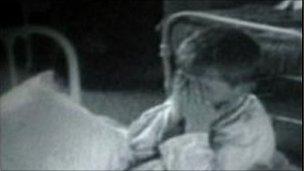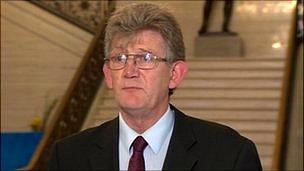Executive to establish inquiry into abuse
- Published

The inquiry will examine allegations of abuse going back to the 1940s
The executive has agreed to establish an inquiry into allegations of abuse in children's homes and other care institutions going back as far as 1945.
The organisations who ran the institutions will face pressure to explain the treatment of children over the course of five decades.
They include Catholic religious orders, state and voluntary groups.
The inquiry follows lengthy judicial examinations of horrifying tales of abuse in the Irish Republic.
Concern has been expressed that passing the legislation necessary to give the inquiry powers to compel witnesses to appear and to obtain all relevant records could take the Northern Ireland Assembly two years.
Therefore the plan is to move forward immediately with other elements.
An advocacy service, designed to support victims of abuse, is to be created within around two months.
Then an "acknowledgment forum" will commence work behind closed doors.
The forum will enable survivors of the often harsh regimes inside homes to tell their stories, and will seek to gather evidence from those organisations with authority over the institutions.
No immunity
The forum is expected to be headed by a senior legal figure, someone with understanding of children's services and an expert in child psychology.
It is hoped the forum will begin its work in around four to six months.
Although the proceedings will be confidential, there will be no immunity for those facing allegations.
Any new information about possible criminal offences which emerges from forum hearings will be passed to the police.
Researchers will be hired to work alongside the forum, in order to provide an accurate context for any allegations.
After the assembly has pushed through its legislation the inquiry will be established on a statutory footing.
Some campaigners believe the delay could be avoided by using the current 2005 Inquiries Act.
However Stormont sources have said their legal advice is that a new law is required to deal with complaints prior to 1973.
The executive is expected to formally apologise to the victims, although that may not happen until the forum has established the full facts.

John McCourt said it was a victory for victims and survivors
Victims are expected to be compensated not with cash, but with funding towards services that meet their needs, such as family holidays or retreats.
One informed source said "we are not going to financially underwrite the Catholic church".
In the Irish Republic, more than a billion euros was spent on an inquiry into institutional abuse.
There is no firm estimate yet of the cost or duration of the Northern Ireland inquiry, but sources suggest it will run into tens of millions but not hundreds of millions of pounds.
'Traumatic legacy'
Speaking after the executive meeting, First Minister Peter Robinson said: "In our meetings with victims we have been moved by their experiences and how they continue to live with the traumatic legacy of the past.
"We have listened to them and designed a process to meet their needs.
"This inquiry will be given the necessary statutory powers to compel people and documents."
Acting deputy First Minister John O'Dowd, MLA added: "The road ahead has been mapped out and we do hope that today will mark the beginning of a process that can help to bring a degree of closure to the legacy of hurt and suffering left after the awful experiences of the past."
John McCourt of the Survivors and Victims of Institutional Abuse group said he hoped this day would come "and justice demanded that it would".
"We are satisfied, on the basis of the statement we have read so far, that the needs of the victims and survivors of historical institutional abuse will be addressed through the forthcoming legislation," he said.
"This was a victory for the victims and survivors of institutional abuse.
"It's been a long, emotional journey for the survivors and victims and for the families of those who haven't made it."
- Published21 January 2011